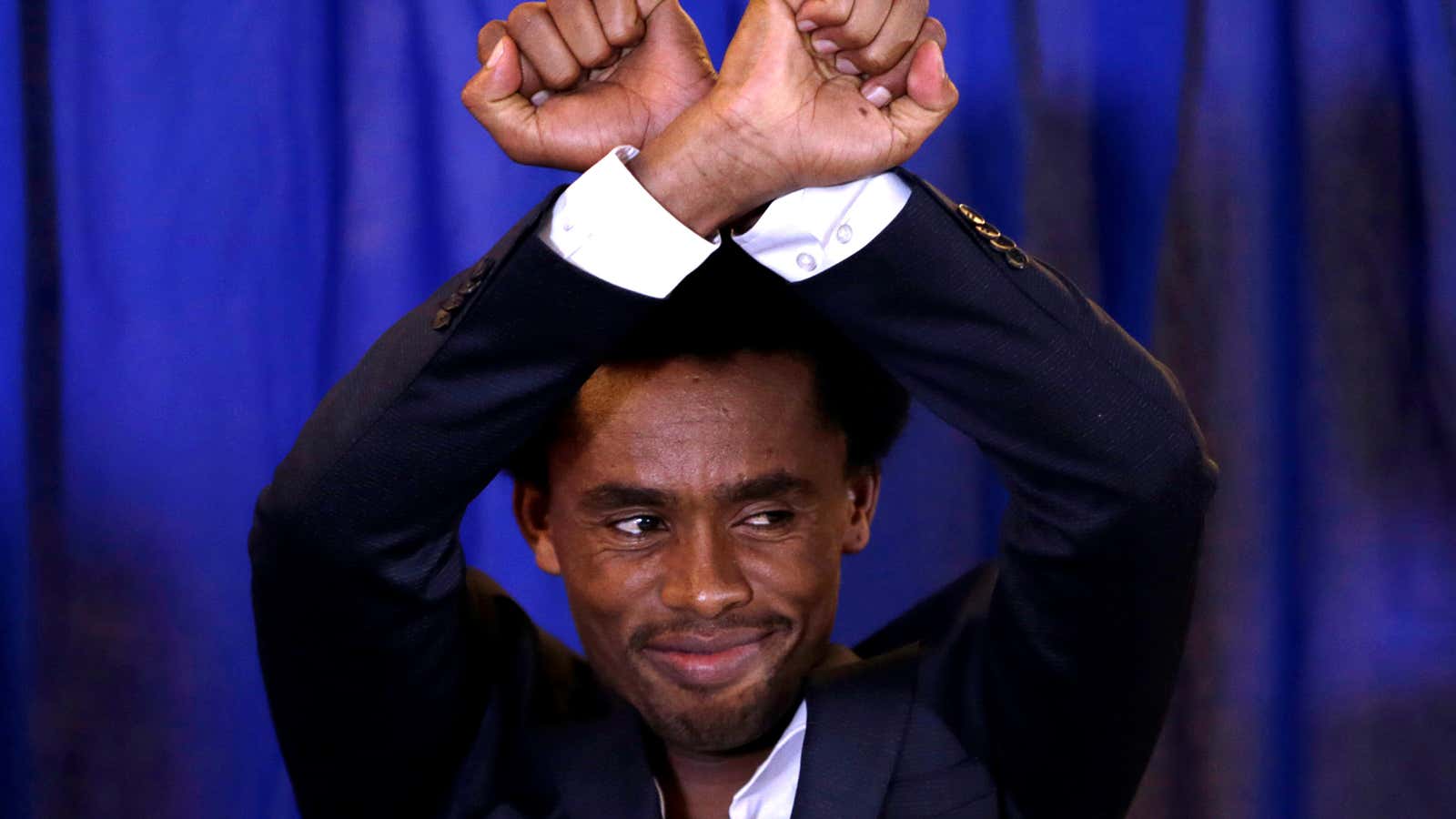Ethiopian marathoner Feyisa Lilesa took his defiance on the running field to Washington DC on Tuesday (Sept. 13), calling the United States and world’s attention to the wave of violent protests that has engulfed his home country.
In his first press conference, almost a week since he came to the United States, the Olympic silver medalist painted a gloomy picture of a country in distress and warned of a looming “ethnic conflict” in Ethiopia. The government, he said, was using the “power of the gun” to silence Oromo protesters, who have been demanding economic, political and land reforms since November last year.
When he crossed his arms at the finish line at the Rio Olympics, he said he wanted the world to “finally see and hear the cry of my people.” More than 500 people, mostly from the Oromo and Amhara communities, have been killed in largely peaceful protests, according to human rights organizations.
The news conference was also attended by some members of the US Congress, who said they were “concerned” about the protests in Ethiopia. Congressman Chris Smith from New Jersey’s 4th congressional district also announced the introduction of a House Resolution supporting respect for human rights and encouraging inclusive governance in Ethiopia. Smith said that once passed, the resolution will be a “strong statement of policy” that will see funding to the Ethiopian government conditioned to the respect for the rule of law and human rights.
In a separate news conference at the Phoenix Park Hotel in Washington, Lilesa highlighted the psychological and personal toll of the current protests. The government’s violent response to the demonstrations, he said, affected him, his family and close friends. He also spoke about his friend Kebede Fayissa, who was killed when the Qilinto prison, located at the outskirts of Addis Ababa, caught fire.
“My legs were running but my mind was preoccupied by all the suffering that was going on around me,” Lilesa said, adding that more athletes are likely to follow in his footsteps in opposing the government.
Yet, despite everything, the 26-year-old said he wasn’t seeking asylum in the United States. The US government has granted him a temporary visa for people with extraordinary skills or abilities. He says he wants to get back to running and is exploring spaces in New Mexico or Arizona for training.
Asked if he would run for the US as an athlete given the chance, Lilesa responded in the negative. “I love my country,” he said. “What I am asking for is freedom and I look back to going to my country once there’s freedom.”
Feyisa said that he regularly communicates with his family, but refused to acknowledge that they faced dangers that were any different from what other Ethiopians were confronting.
“I don’t want to look at my children any different from the children of other people in my country who are being killed,” Lilesa said of his two children, a five-year-old daughter, and a three-year-old son. “They face the same fate and the same destiny like all other children in Ethiopia.”
In an op-ed in the Washington Post on Tuesday, Lilesa said he had received no contact from the Ethiopian government and had no plans to initiate any with them. He conditioned the government to release all prisoners before he can have any talks with them.
Since his arrival in the country last week, Lilesa hasn’t met members of the Ethiopian community in the DC area. He’s set to receive a hero’s welcome at a reception organized by the community on Tuesday (Sept. 3), where songs written in his honor will be performed.
At the end of the press conference, Lilesa, speaking with a soft tone, emphasized why the protest was symbolic for and amongst all Ethiopians. “People are saying from now on we want to live in peace, we are tired of getting killed, we don’t want to be in prison, we don’t want to be forced into exile, we want to decide on our resources and shape the destiny of our country,” he said. “We’ve had enough.”
